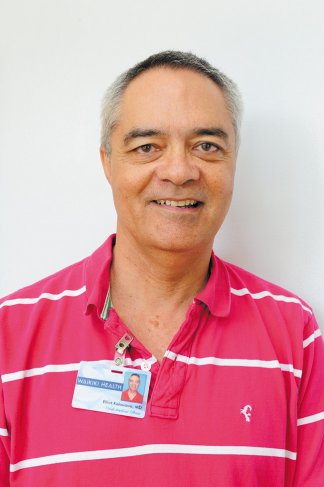Waikiki Health: Serving The Needy
Dr. Elliot Kalauawa
Chief medical officer at Waikiki Health
Where did you receive your schooling and training?
I was born and raised here in Hawaii. I went to Whitman College in Washington and came back and went to medical school at UH. I did my residency here in Hawaii, and then I went to Valley Medical Center in Fresno and did my first year of internal medicine. Then I came back to UH and finished my training in internal medicine.
mw-dih-dr-elliot-kalauawa-nw1
How long have you been in practice?
I’ve been at Waikiki Health 28 years, and before that I was in private practice in Kaneohe for almost two years.
What attracted you to working at Waikiki Health and helping the underinsured and uninsured population?
These are the patients whom I like to work with. I grew up in Palolo housing, so basically I grew up with the kind of patients we have here. After I started here, I saw two of my old classmates who grew up in Palo lo housing and ended up coming here as patients because they were homeless. Neither recognized me, and I didn’t recognize them until I saw their names. When I told them my name, one of them said, “I remember when you were a kid and you always talked about being a doctor. I always wondered if you made it.”
What services does Waikiki Health offer?
My specialty is internal medicine and HIV. We offer everything you would see in a primary care physician’s office, from pediatrics all the way to geriatrics. We have providers who do women’s health and simple office gynecology. We also have an obstetrician at our Salvation Army clinic who does obstetrics focusing on women who have substance abuse issues. We have different programs that focus specifically on the homeless ― not just homeless adults, but homeless teenagers. That’s a separate program because homeless teenagers have different issues from homeless adults. We also have a program that’s geared toward substance abuse. We have a behavioral health department with three psychologists and substance-abuse counselors. We also have a dental clinic.
Can you tell us about the new Moiliili dental clinic?
The dental clinic was really a need. A lot of insurances don’t cover dental. Even some patients who have medical insurance don’t have dental coverage. At our Moiliili location we have two dentists, and we do primary care as well, so we have a psychologist there and five medical-care providers.
How many centers do you have?
We have so many centers and services that I can’t keep track because the number is always changing. Right now, we’re at about seven.
(See waikikihealth.org for a comprehensive list of Waikiki Health services.)
Are the centers targeted toward impoverished communities?
A lot of times people think we’re a free clinic, but technically we’re not. They think only poor people can come here, and people without insurance.
But we actually see the full range. I have patients who are doctors and lawyers. They are well-insured and they can go any place they want. It’s not only for the poor, it’s for everybody. But there is a special interest toward the poor and the homeless because we’ve been doing that a long time.
That population has a hard time. Our high-functioning patients can go anyplace, but our less-functioning ones have a hard time going to other places, so that’s an area we enjoy providing service to.
Can you talk more about the youth services that you provide?
A lot of our young patients come from abusive homes or were kicked out by their parents. So they have lots of emotional issues. Adults also may have emotional issues to a degree, but this is where there’s a stereotype. People think homeless adults all have mental illnesses or substance abuse, but that’s not so. Some of them have just lost their jobs and don’t have enough money to come up with not only the first month’s rent, but also a deposit.
The young ones have more emotional issues than the adults do. Feeling like you’re not loved by your parents is traumatic for any young person.
What do you do in your role as chief medical officer?
I supervise the medical aspects of our health center, but I also see patients. With some medical centers, the chief medical officer does strictly administrative work, but I like to see patients. Sixty to 70 percent of my time is seeing patients, and 30 to 40 percent is supervising staff and getting involved with various programs.
Anything else you’d like to mention?
Waikiki Health offers a lot of services to the community. The center started out 50 years ago as a drug clinic in our main building in Waikiki. Then it spread and we started doing general medical services also.
When I started here, we had 15 employees and we weren’t really growing, but now we’re really expanding.
When I started, we had two medical exam rooms and all of our programs were in this one main building, and now we have 15 exam rooms in this building alone.
A year after I started, we began our homeless program, our Care-A-Van that provides drop-in medical services. We didn’t have the Care-A-Van at the time, so the homeless were all coming here to our Waikiki Health building. I was the only provider, so I was seeing all of the patients who came in.
Then we started to grow, and now we have several different locations with more than 150 employees. Most of that growth has happened in the last seven years.
rfournier@midweek.com






